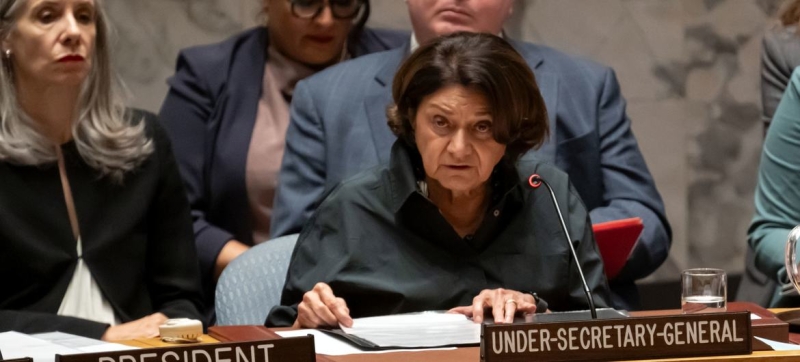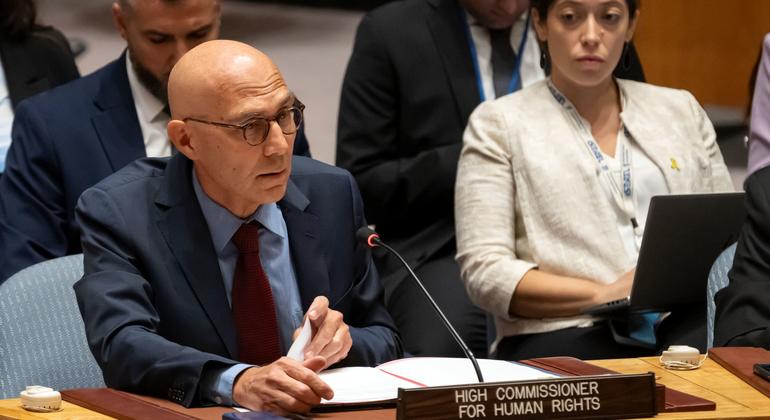
UN Under-Secretary-General for Political Affairs Rosemary DiCarlo Security Council discusses fallout from Lebanon communications explosions Peace and Security
The risk of further escalation of violence poses a serious threat to Lebanon, Israel and the entire region, UN Under-Secretary-General for Political Affairs Rosemary DiCarlo said on Friday, speaking at a Security Council meeting convened in connection with the recent events in Lebanon.
The extraordinary meeting was convened at the initiative of non-permanent member of the UN Security Council Algeria, following a request from Lebanon. According to the latest information provided during the meeting, at least 37 people, including two children, were reportedly killed and more than 3,400 injured, some seriously, as a result of the explosion of pagers, two-way radios and other electronic devices.
Read also:
Pager manipulation a flagrant violation of international law, UN experts say
According to Rosemary DiCarlo, for almost a year now, Hezbollah and other non-state armed groups, as well as the Israel Defense Forces, have been engaged in almost daily exchanges of fire in violation of Resolution 1701. As a result, the rapporteur noted, more than 100,000 people have been forced to flee their homes in southern Lebanon, while at least 60,000 have fled from northern Israel. DiCarlo added that the exchanges have resulted in numerous civilian casualties, as well as significant damage to homes, civilian infrastructure and agricultural land on both sides of the Blue Line.
The UN spokeswoman reported that the Islamic Republic of Iran, in a letter to the President of the Security Council dated September 18, blamed Israel for the explosions of electronic devices on September 17 and 18. To date, the Israeli government has not made any official comments on these events, she added.
Escalation of the conflict
Since then, the situation has shown worrying signs of escalation, DiCarlo said. “We are also receiving preliminary reports of an Israeli air strike in a southern suburb of Beirut a few hours ago, which Israel says killed a number of senior Hezbollah operatives,” she said. – Lebanon’s Health Ministry said the strike killed at least 12 people and wounded more than 60.”
“Meanwhile, shelling from Lebanon killed two IDF soldiers and wounded ten Israelis,” the UN deputy chief added.
According to her, the UN Interim Force in Lebanon (UNIFIL) is closely monitoring developments, and UN Special Coordinator Jeanine Hennis-Plasschaert is in constant contact with all interested parties and continues to insist on a diplomatic solution to the conflict. Hennis-Plasschaert will visit Israel for talks early next week.
“The threat to security and stability not only in Lebanon but also in the region could not be more obvious or more serious. The Secretary-General has already expressed his deep concern about these events,” Rosemary DiCarlo told the UN Security Council.
“The Secretary-General continues to urge the parties to recommit themselves to the full implementation of resolution 1701 and to return immediately to a cessation of hostilities,” she said.
“A New Word in Military Affairs”
“I am appalled by the scale of the attacks of 17 and 18 September in Lebanon and Syria and the impact of these attacks on civilians,” UN High Commissioner for Human Rights Volker Türk told the UN Security Council on Friday.

These attacks, he said, represent a new era in warfare, where communications are being weaponized, exploding in markets, on street corners, and in homes amid everyday life. Authorities have reportedly dismantled unexploded devices at universities, banks and hospitals.
The attacks have caused fear among the population, sowing panic and terror, Turk stressed, recalling that people in Lebanon have already been living in conditions of instability and a protracted economic crisis for years.
War has rules
“War has rules. For all parties to this and any other armed conflict, without exception,” said the UN High Commissioner for Human Rights.
Armed force may be used only where necessary to achieve a legitimate military objective, and civilians must be spared from attack.
Read also:
Rules of War: What You Need to Know About International Humanitarian Law?
“The simultaneous targeting of thousands of people, whether civilians or members of an armed group, without precise knowledge of the ownership, location and environment of the objects used at the time of the attack, is a violation of international human rights law and, in “in appropriate cases, international humanitarian law,” the UN human rights chief noted.
According to him, if it is impossible to assess the compliance of an attack with international law during its preparation, the plan must be abandoned. International humanitarian law, Türk added, prohibits the use of booby traps, which are seemingly harmless portable objects that are specifically designed and manufactured to contain explosives.
Possible war crime
He also stressed that violence aimed at sowing fear among the civilian population is a war crime.
The High Commissioner called for an independent, thorough and transparent investigation into the circumstances of the explosions. “Those who gave orders and carried out these attacks must be held accountable,” Turk stressed.
He also noted that while this method of warfare may be new, it is also subject to international law.
Situation in the Middle East
Turk noted that the latest developments occurred against the backdrop of the war in Gaza and should not be seen as an isolated incident. He recalled the Palestinian casualties and Israelis killed in the Hamas attack on October 7, as well as the violations Israel is committing in the Occupied Palestinian Territory.
Turk called for a ceasefire in Gaza, the release of Israeli hostages, and “a comprehensive review of Israel’s policies and practices, as was made clear by the International Court of Justice in its advisory opinion in July.”
US: Widening of conflict can be avoided
Robert Wood, the US Ambassador and Deputy Permanent Representative to the UN, said that no one is seeking to widen the conflict in the Middle East and that such a development can be avoided. He confirmed that the US is not involved in the incidents in Lebanon.
At the same time, the American diplomat said that the Security Council should not ignore the origins of the conflict between Israel and Hezbollah. “Before the brutal terrorist attacks by Hamas, the situation along the Blue Line had been largely stable for 18 years since the adoption of Resolution 1701,” he said, adding that that stability was disrupted on October 7 and 8 last year, when non-state armed groups from Lebanon carried out “unprovoked” attacks on Israel.
Russia: “We regard what happened as a terrorist act”
“We regard what happened as a terrorist act that poses a threat to regional peace and security with unpredictable consequences for the entire Middle East,” said Russia’s Permanent Representative to the UN Vasily Nebenzya. “We strongly condemn this unprecedented attack on friendly Lebanon and its citizens.” According to him, the attack is a gross violation of Lebanon’s sovereignty and a serious challenge to international law. Nebenzya also condemned today’s shelling of Lebanon, stressing that the “spiral of violence” is undermining the US administration’s declared peace efforts.
